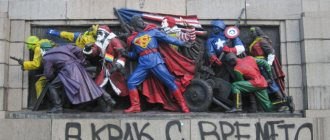Petty hooliganism: Code of Administrative Offenses
The legislation defines three types of objects of encroachment. Violation of the functioning of enterprises and institutions is manifested in the disorganization of their work through the commission of hooligan acts. An attack on the peace of citizens is the creation of noise that interferes with the normal life of people.
This could be singing songs loudly, playing music, driving a vehicle without a muffler at night, and so on. The article “Petty hooliganism” contains some distinctions between attacks on public order and the peace of citizens. According to a number of authors, such isolation can hardly be called correct. This is due to the fact that disturbing the peace of people cannot occur without encroaching on public order.
Types of hooliganism in the Criminal Code of the Russian Federation
The qualifying signs of hooliganism are provided for in Part 2 of Art. 213 of the Criminal Code of the Russian Federation:
- Hooliganism on public transport (land, water, air);
- Hooliganism motivated by hatred towards any social group;
- Hooliganism motivated by political, ideological, racial, national or religious hatred or enmity;
- Hooliganism with the use of weapons (or objects used as weapons);
- Hooliganism associated with resisting a person performing duties to protect public order;
- Hooliganism associated with resistance to a representative of authority;
- Hooliganism committed by a group of persons by prior conspiracy;
- Hooliganism committed by an organized group;
- Hooliganism committed with the use of explosives or explosive devices.
Signs of offenses
From the objective side, petty hooliganism is characterized by the active behavior of the offender. In particular, a citizen can:
- Use obscene words.
- Harass people by insulting them.
- Commit other intentional offenses.
Petty hooliganism is committed by the internal urge of a person to disrupt order in society, to show disrespect for people or an individual citizen. Moreover, the perpetrator has no significant or compelling reasons to do this. Such goals indicate the presence of hooligan motivation. In some cases, failure to respond to the demands of others or persons who are called upon to maintain order to stop such behavior also indicates a motive.
What is hooliganism from a legal point of view?
In the text of Art. 213 of the Criminal Code of the Russian Federation one can find the following definition:
Hooliganism is a gross violation of public order, expressing clear disrespect for society.
The following must be kept in mind:
- In this case, a gross violation of public order means any actions that cause significant harm to such order (for example, disruption of a mass event or disruption of transport);
- A mandatory sign of criminal hooliganism is the use of weapons or objects used as weapons - this could be, for example, a baseball bat, an ax or a piece of rebar (an exception is possible only if we are talking about hooliganism based on racial, political or religious enmity);
- Another distinctive feature of hooliganism is that this crime is committed publicly and openly - for example, in the presence of visitors to public places;
- The crime is considered completed from the moment the hooligan acts are committed.
Obscene language
In general, it is expressed in the utterance of statements that are not accepted as commonly used words. The offender tends to speak swear words loudly so that others can hear them. Saying obscene expressions not out loud cannot be considered as petty hooliganism. The expression “obscene language” consists of two parts.
To be more precise, this term should be understood as swearing using obscene words. It should be said here that the expression of rude words in the process of swearing will not in all cases form a sign of a type of petty hooliganism. In such situations, there may be no corresponding motive. If he is absent, not a single act can be recognized as petty hooliganism. The motive may be failure to respond to demands from others to stop cursing using obscene language.










